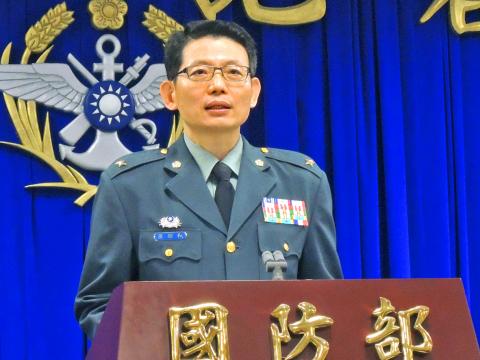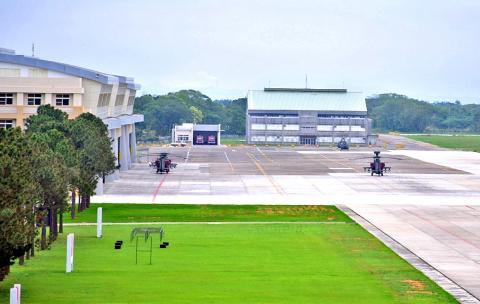The Ministry of National Defense (MND) yesterday vowed to investigate if its spokesperson’s Facebook account had been hacked, after netizens objected to remarks posted on Facebook after a public uproar over prosecutors’ decision not to press charges against 15 military officers and civilians over a tour of a military base where Apache helicopters are based.
Several statements that appeared yesterday on ministry spokesman Major General David Lo’s (羅紹和) official Facebook page brusquely brushed off calls by netizens for military bases to be opened to the public to view the Apaches and other high-tech equipment.
Lo told a news conference at the ministry that he had not written the comments and that an internal investigation would be launched to determine if the Facebook account had been hacked.

Photo: Lo Tien-pin, Taipei Times
The Facebook fuss was the latest development in the controversy sparked by an unauthorized tour of a Taoyuan military base given by 601st Air Cavalry Brigade Lieutenant Colonel Lao Nai-cheng (勞乃成) to several civilians, including TV celebrity Janet Lee (李蒨蓉).
Following the prosecutors’ decision last week not to press charges over the tour, several online petitions were launched calling for public access to the base in Longtan District (龍潭), where the Apache squadron is stationed.
More than 270,000 people signed the petitions, while several borough wardens from cities nationwide have organized tours to local military bases.

Photo: Lee Jung-ping, Taipei Times
Lo’s Facebook page, which usually features information about events and activities by the armed forces, was flooded by messages protesting the prosecutors’ decision and what some saw as the ministry’s efforts to sweep the controversy under the carpet.
In response to these postings, someone with the title “official MND spokesperson” wrote: “In this time where populism rules, it is meaningless to defend the armed forces. Who do they think they are?”
Democratic Progressive Party Legislator Tsai Huang-liang (蔡煌瑯) said the ministry has handled the “Apache helicopter tour” scandal badly and underestimated the public’s anger over privileges and tours granted to celebrities and the families and friends of military personnel while bases remain off-limits to the general public.
The ministry also took steps yesterday to temper some of that anger by announcing that AH-64E Apache helicopters would be put on display at base open days this fall.
They are scheduled to appear at the Tsoying Naval Base in Kaohsiung on Oct. 24 and at Hsinchu Air Base on Nov. 21, Lo said.
He said that public agencies, schools and other registered groups can apply in advance to visit bases, and that permission would be given if such visits were not disruptive of training, daily routine or the rights and interests of military personnel.
Chinese citizens, Hong Kongers and Macau residents would not be permitted to visit Taiwan’s military bases, he said.
Visitors cannot engage in political campaign activities while on tours or bring campaign vests, flags or banners onto bases, Lo said.
Additional reporting by CNA

SECURITY: As China is ‘reshaping’ Hong Kong’s population, Taiwan must raise the eligibility threshold for applications from Hong Kongers, Chiu Chui-cheng said When Hong Kong and Macau citizens apply for residency in Taiwan, it would be under a new category that includes a “national security observation period,” Mainland Affairs Council (MAC) Minister Chiu Chui-cheng (邱垂正) said yesterday. President William Lai (賴清德) on March 13 announced 17 strategies to counter China’s aggression toward Taiwan, including incorporating national security considerations into the review process for residency applications from Hong Kong and Macau citizens. The situation in Hong Kong is constantly changing, Chiu said to media yesterday on the sidelines of the Taipei Technology Run hosted by the Taipei Neihu Technology Park Development Association. With

CARROT AND STICK: While unrelenting in its military threats, China attracted nearly 40,000 Taiwanese to over 400 business events last year Nearly 40,000 Taiwanese last year joined industry events in China, such as conferences and trade fairs, supported by the Chinese government, a study showed yesterday, as Beijing ramps up a charm offensive toward Taipei alongside military pressure. China has long taken a carrot-and-stick approach to Taiwan, threatening it with the prospect of military action while reaching out to those it believes are amenable to Beijing’s point of view. Taiwanese security officials are wary of what they see as Beijing’s influence campaigns to sway public opinion after Taipei and Beijing gradually resumed travel links halted by the COVID-19 pandemic, but the scale of

A US Marine Corps regiment equipped with Naval Strike Missiles (NSM) is set to participate in the upcoming Balikatan 25 exercise in the Luzon Strait, marking the system’s first-ever deployment in the Philippines. US and Philippine officials have separately confirmed that the Navy Marine Expeditionary Ship Interdiction System (NMESIS) — the mobile launch platform for the Naval Strike Missile — would take part in the joint exercise. The missiles are being deployed to “a strategic first island chain chokepoint” in the waters between Taiwan proper and the Philippines, US-based Naval News reported. “The Luzon Strait and Bashi Channel represent a critical access

Pope Francis is be laid to rest on Saturday after lying in state for three days in St Peter’s Basilica, where the faithful are expected to flock to pay their respects to history’s first Latin American pontiff. The cardinals met yesterday in the Vatican’s synod hall to chart the next steps before a conclave begins to choose Francis’ successor, as condolences poured in from around the world. According to current norms, the conclave must begin between May 5 and 10. The cardinals set the funeral for Saturday at 10am in St Peter’s Square, to be celebrated by the dean of the College